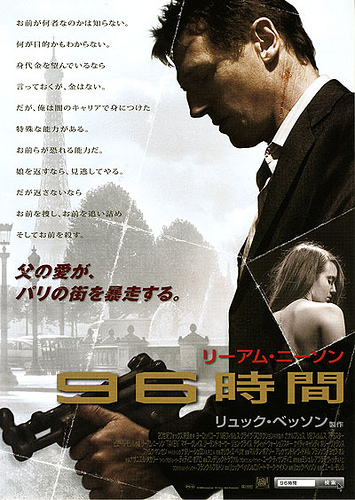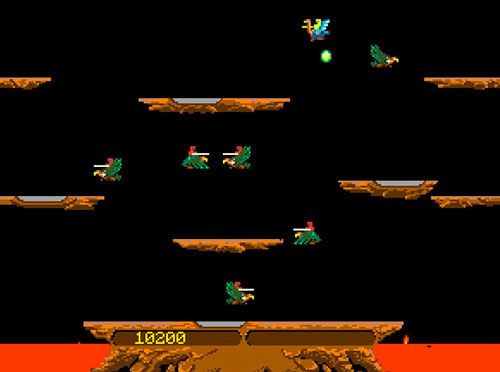
Editor's note: Could a return to "high-concept" gaming draw in bigger crowds? I think Daniel is on to something here — many iconic titles that immediately come to mind when discussing video games fit this description. Perhaps this, and not waggle or 3D, is the answer to reaching and retaining a larger audience. -Rob
I recently had the pleasure of watching Taken, a 2009 film featuring Liam Neeson rampaging his way through Paris to reclaim his kidnapped daughter.
At a lean 93 minutes, the movie surges forward at a great speed. Neeson wastes little time dispatching his on-screen enemies, and the movie doesn't bother with extraneous characters or sub-plots.
Taken is a “high-concept” movie: You can lay out the essential elements in a single sentence — as I did above. Indeed, the title alone is a succinct take on the entire plot, which makes it high-concept itself (like Snakes on a Plane or RoboCop).
Yet as these types of movies reach millions of people every year, developers burden video games with increasingly convoluted narratives and obtuse titles. We should have more high-concept, accessible games to choose from — way more.
A look back at early video games reveals an entire industry driven by high-concept fare. Pong, Space Invaders, and Breakout are just three classics that require but a scant few words of explanation to enjoy. In part, this reflects the simplicity of the technology at the time, which limited the scope of early titles.
But technological restrictions weren’t the only reason high-concept games were more common — fewer titles overall also played a role. You could make a baseball game and call it Baseball. Even when games explored new ideas and got a little weird, the title was often a clear indicator of what to expect. Flying ostriches aside, Joust’s high-concept name is as straightforward as they come.

So what went wrong? Years of graphical advancement, an increasingly crowded marketplace, and a bit of hubris have left video games on the edge of mainstream entertainment looking in. Unless a person actively follows industry news or aggressively loiters in retail stores, the average consumer has precious little information to work with when choosing a title.
Brand names aside, what the hell does Halo: ODST mean? Red Dead Redemption? Splinter Cell: Conviction? Even I had to look up the name of that last one, and I inundate myself with gaming news every single day of my life.
A few notable exceptions exist. Portal is a perfect example of a high-concept game with a descriptive title that is approachable and easy to explain. So is Left 4 Dead, actually, which serves as a reminder that Valve is very good at reaching out to customers.
Generic sounding titles Guitar Hero and Rock Band drive music games to million-seller status. The same goes for the Wii: Sure, the name of the console doesn’t make much sense, but Wii Sports, Wii Fit, and third-party titles like Just Dance have proven to be huge hits.
Rest assured, I am not calling for an end of “low-concept” gaming. Bioshock has a perplexing title and can hardly be summarized in a single sentence, but it’s one of the greatest games I’ve ever played. Noby Noby Boy is a delightfully nonsensical title in name (it makes a bit more sense in Japanese) and in operation, but I enjoy its inscrutable nature.

Rather, I would hope that publishers figure out that bigger games with better graphics and more buzzwords (Multiplayer! Leaderboards! Co-op! DLC!) isn’t going to get more people into the pastime. Instead, simple and accessible titles are more likely to draw crowds of new customers — some of whom will stick around for the next triple-A blockbuster.
Hollywood uses high-concept material to fill theaters while movie critics celebrate more complex films. Complicated video games are all the rage with the Metacritic crowd while high-concept, indie software struggle to reach an audience.
Of course, even a hit video game is nothing compared to a hit movie. Tim Burton’s awful Alice in Wonderland will draw more eyeballs than any game will this year. Tell me that doesn’t drive you crazy.
Lest I sound like Chicken Little, the sky is not falling. Video games are big business these days and have come a long way from sharing shelf space with Barbie dolls at the local Toys "R" Us. But as a gamer, I want to share my favorite hobby with everyone. I want gaming to be something I can enjoy with my entire family instead of something I do while they sleep. To be sure, they’re not put off by the controller or the prices: I’ve got everything they could want ready and waiting. The games themselves are simply too intimidating.
Daniel Feit was born in New York but now lives in Japan, where he teaches English to Japanese children and writes for Wired Game|Life. Follow him on Twitter @feitclub or visit his blog, feitclub.com.
VentureBeat's mission is to be a digital town square for technical decision-makers to gain knowledge about transformative enterprise technology and transact. Learn More
